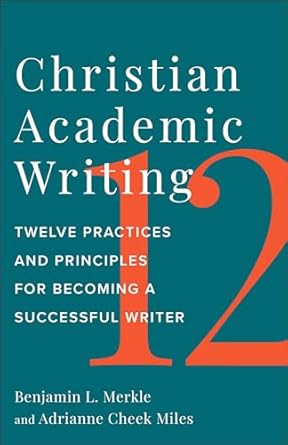A Book Review from Books At a Glance
by Ryan M. McGraw
As a pastor, professor, and author, I am mildly obsessed with books about writing and communication. Writing is a form of communication, and all forms of communication are linked. People often think that they can speak well though they cannot write well. Conversely, reading a paper publicly is not really peaching or public speaking, but sharing a paper verbally. Speaking and writing are not the same, but they are cousins. Like learning a language, the more easily we communicate in one venue, the better communicators we become in every other.
This book will likely catch the eye of academic researchers and professors. However, the counsel in it is relevant to anyone seeking to learn how to read deeply and communicate what they read to others. Writing is a vital part of learning and thinking, whether one writes for publication. Though pastors in particular aim for the Spirit’s work through their ministries, it is possible to spiritually reason ourselves out of Spirit-led hard work in learning how to organize our thoughts and present them in clear and gripping ways. Christian Academic Writing offers solid common-sense practices that will help both academic writers and others wanting to teach and reach people better.
This book’s authors are experts in New Testament biblical studies and English and Linguistics. In twelve chapters, they outline twelve basic principles. These include loving your topic, reading all the time, creatively redeeming the time to read and write, busting myths about writing, avoiding procrastination in writing, making writing a habit, not expecting a first draft to be sufficient, seeking critical feedback, not fearing feedback received, participating in conferences, continually improving writing through hard work, and finishing what we start. Appendices A and B describe various academic publishers to help prospective authors get going, followed by a list of religious organizations in appendix C. The final appendix (D) helpfully annotates substantial books on writing from a wide variety of fields and authors, including the popular fiction author, Stephen King (who appears regularly in the footnotes). Chapters eight and nine on feedback may surprise many readers. While most people dread critical feedback, Merkle and Miles argue rightly that it is the only way to grow. Even successful authors like John Grisham and J. K. Rowling received twenty-eight and twelve rejection letters, respectively, for A Time to Kill and Harry Potter (87-88). This highlights the fact that almost no one who is good at anything gets it right the first time. Far from discouraging our efforts, feedback is a gift, leading us to listen, learn, and get better. Unfortunately, many pastors and other non-academic teachers have no feedback loop to help them improve their work. Learning from the process of writing for publication can give such people analogous ideas. Perhaps pastors and teachers can critique each other’s sermons and lessons, or read lots of books on writing and communication, as the authors of this volume recommend. In any field, if we do not find a way to improve and challenge ourselves through critical feedback, then we will stagnate, solidifying bad habits. Writing, even if not for publication, can help everyone communicate better. As the authors note, “As we write, we often gain clarity and insight on concepts that are cloudy in our minds” (37).
Chapter four, listing five myths challenging writers, is particularly insightful, pulling in many gems scattered throughout the book. First, the authors caution against waiting to write until an author believes that they will produce their magnum opus (32). Instead of being humble, this often results in inactivity through fear, procrastination, and even laziness. Second, writers often fail to start because they believe that they are “imposters” (33). Realizing one’s limits and areas of ignorance is a virtue, but we should write about what we know if we really have something to say. Third, many won’t start writing until they can “clear the deck” of everything else they are doing (35). The real-life advice here is that this almost never happens for anyone in any area of life (62). Fourth, writers fail to finish what they start due to the “seduction” of needing just one more source (36). Yet no one knows everything, and omniscience is not prerequisite to contributing meaningfully to a current scholarly conversation. Fifth, writers should not wait until they bolster their credentials further (38). Scholars are already experts in their fields on some level. Yet only those who read widely will write often will likely have something useful to say (115). These myths affect publishing authors directly. Yet, taken as a whole, they envelop temptations common to all, including pride, self-deception, and unrealistic expectations. Writing for publication can become an exercise in mortifying the deeds of the flesh and putting on the new man in humble knowledge, disciplined righteousness, and productive holiness in the Spirit.
Christian Academic Writing is an ideal entry point for scholars and students desiring to learn through faith rather than standing still through fear. It is a great text for college and seminary students, as well as PhD candidates and professional academics. Yet the principles of learning discipline in one area of life apply to others. Those who learn to write well and who labor to get better at writing will also learn better how to communicate well and manage life well.
Ryan McGraw
Greenville Presbyterian Theological Seminary
